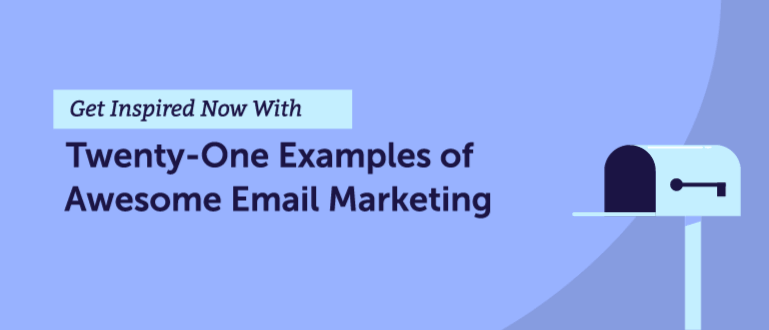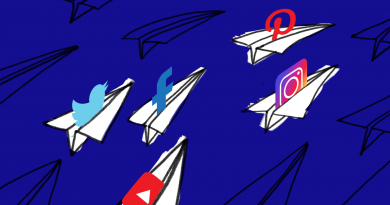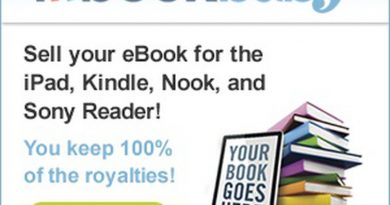21 Awesome Email Marketing Examples To Inspire Your Own

If you’ve worked in marketing long enough, you’ve probably been asked one of these questions:
- “Before we move forward, do you have an example of this working for another brand?”
- “Can you show me how our work compares to other companies?”
- “Did you research any examples before putting this together?”
Odds are one of those questions might have sent you back to the drawing point.
At that point, you probably asked yourself one of the following, too:
- “I wonder how other companies do this?”
- “It’d be cool if I could see some samples for this from another brand. If only …”
- “Is our tactical execution keeping pace with the industry?”
And that’s why you’re here. You’re an email marketer, and you need examples to follow.
That includes:
- Newsletter designs to inspire your own.
- Crafty copy that’ll help spark your creative genius.
- Technical concepts that make you wonder, “Why didn’t I think of that?”
You’ll find all that here, plus a smattering of templates to help you act on your inspiration.
Get Inspired With 21 Awesome Examples …
… then execute your own email marketing better with these free templates:
- Email Marketing Calendar: Plan your work, then work your plan! Stop wondering when each email will send and start using a calendar.
- Email Newsletter Template: Streamline your email copywriting process.
- Welcome Email Newsletter Template: Write better welcome emails for new subscribers with this simple template.
What Makes Email Marketing So Important?
To summarize it in three letters: ROI.
Few marketing channels deliver greater measurable value than email. It’s a direct line to customers and leads they’ve opted into.

Manage Email Marketing With CoSchedule
And if you’re searching for tools to help organize and execute better email marketing, get started with CoSchedule. It’s the ultimate all-in-one marketing management platform for planning and executing everything you need to get done.
Plus, it integrates with key email service providers like MailChimp, ActiveCampaign, Constant Contact, and Campaign Monitor, so your marketing team can have full visibility of every email you deliver on one comprehensive marketing calendar.

Or, start a free 14-day trial.
What Will These Examples Demonstrate?
Before digging into each example newsletter below, here’s what each will be evaluated on:
- Who sent this email? There’s a mix of major brands, media companies, bloggers, and more.
- What makes it work? From design to copy and beyond, each one offers at least one takeaway you can act on.
- How can you emulate it? Quick tips and links to external resources to help you implement what you learn.
1. Nike
This seasonal email from Nike is just in time for summer. The design is simple, the copy is minimal, and overall, it gets right to the point.
The CTA buttons prioritize the Men’s section (likely based on my demographic info when I joined their list), but were I shopping for family (say, kids), those options are presented, too. With its sand-like background color, it also invokes beach imagery.

How to Emulate This Example
Visually, this email relies on sharp photography and creative product layout. That, combined with concise copy, leads to a crisp and uncluttered design that keeps the focus on the product.
Here’s what you’ll need:
- High-quality product photography. If you have a photographer on staff, you’re golden. Otherwise, investing in a DSLR and learning the basics of photo composition may help.
- Understand how to use list segmentation. And send emails with the most optimal CTA to different segments. For example, another version of this email could have been sent to women.
For such a simple email, there’s a little bit more happening here than it appears.
Back to the Top
2. Threadless
Creative clothing and decor retailer Threadless has a strong visual brand. That comes across in their email marketing.
This email starts with striking imagery and an intriguing value proposition (new designs). It doesn’t waste time providing the CTA button to check them out, either.

Beneath that, a giveaway offer smartly shows how their prize products might look in a living space. The “Last Chance!” copy helps build some urgency, too.

The next content section shows how their shirt looks on someone actually wearing it. Plus, it incorporates a quote from the artist who designed it.

This last portion at the bottom includes something creative that’s easy to miss, too. Instead of generic “UPDATE YOUR EMAIL PREFERENCES” copy, it reads “GET BETTER EMAILS.” That puts the recipient first and offers a benefit rather than a command.

How to Emulate This Example
Threadless has exceptional visual design. Even if your company doesn’t, there are still a few things you can take away from this.
- Infuse your copy with urgency. This guide from Copyblogger will help you there.
- Use benefit-driven CTAs. Copy like “Shop Now” and “Enter Here” are clear and simple. If there are ways to more directly sell a benefit, though, consider experimenting.
- Include quotes. People love ‘em. They can also help add visual interest to your copy (particularly if you don’t have access to top-quality design).
Back to the Top
3. Webpage FX
This Pennsylvania-based agency sometimes sends emails that are written like full blog posts. Ordinarily, you might think this goes against best practice, because no one will read the post on your site if they can get it in their email.
But, is that a problem as long as they’re getting your content?
That appears to be the logic here, because instead of sending readers somewhere else to read, they smartly link out to a call to action (turning three clicks from email to blog to CTA down to just two, from the email to a landing page).

In-line images even use directional markup like they would in a blog post:

Then, once they have the reader hooked, they let them know, “Hey, our agency can help you execute this.” It’s a great example of offering enough information to be helpful, but leaving enough out to where one might want some assistance.

How to Emulate This Example
This is simple:
- Write your email like a typical how-to blog post. You can get help on that here.
- Then, drop a relevant and high-value call-to-action into your content. Here’s what you need to know about writing compelling CTAs.
Effectively, instead of using email to get blog traffic, you’re creating the same content and cutting out a step between the reader getting to your site and actually converting. That’s smart.
Back to the Top
4. Hotjar
Plain text doesn’t have to be plain. This example from Hot Jar uses appealing fonts and color coordination to make a simple email promoting a podcast episode look great.

Below, they tempt listeners to click with a free t-shirt offer (and use some simple visual styling to make things look a little more interesting):

David’s mugshot even uses a color filter effect to make it stand out.
How to Emulate This Example
There’s not much to this one but it works exceptionally well. Even if you’re not a design wizard, you can still make your plain text emails look anything but boring.
- Pick two or three colors to use. Ideally, ones your brand already uses. You can learn all about color psychology in marketing (and snag a free HEX color chart) here.
- Use the HEX color codes in the post linked above to pick colors you know will look good together. Never mind if you think you have an eye for what looks good. That post will keep you on the right track.
Then, when creating an email in your email platform, use those colors on your buttons and background styling.
Back to the Top
5. Siege Media
Here’s another example of an awesome plain text email. It keeps things skimmable by using single-sentence paragraphs and getting right to the point (this especially makes reading on small phone screens easier).

How to Emulate This Example
This is even more simple than the Hot Jar example before. Simply use a color that’s used in your logo or branding, and adjust the color of your link highlighting and buttons in your email service provider. Keep your copy tight and concise, and you might be surprised how much better your email looks.
Back to the Top
6. Nintendo
This email from Nintendo makes creative use of an embedded GIF. Not only does it look cool, but it ties in well with the Nintendo Labo’s marketing tagline:

Directly beneath that is a CTA with a cardboard-like texture, invoking the Labo’s cardboard design:

Next, it shows off some things that can be created with the Labo:

The last call-to-action is for a contest that plays off creativity and gets the reader engaged:

How to Emulate This Example
You might not have the brand recognition of Nintendo. But, don’t let that stop you from turning this awesome email into actionable inspiration:
- Experiment with GIF email headers. GIF Maker from GIPHY is a great free tool for doing this the easy way. This guide from Lifehacker offers more options, from free to Photoshop.
- Incorporate visual elements from your product in your email design. The Labo is a cardboard kit that can be turned into all kinds of different devices. So, the email uses a cardboard-like backdrop texture. Think about what colors or textures your product invokes and collaborate with a designer to incorporate them.
BRB, I need to order a Labo now.
Back to the Top
7. The Verge
Here’s another example of plain text being anything but plain. By using a stylish yet understated header, an interesting font that fits their tech-centric aesthetic, and a little bit of color (borrowing the pink shade from their visual identity system), the Verge makes their daily email update look awesome.

How to Emulate this Example
There are a few things going on here that can easily be replicated:
- Use a consistent header graphic: Try creating one with Canva or work with your design team to create something simple.
- Change your linked text color: Make it match your branding.
- Keep your copy conversational. Rather than just blast out links, each edition of their newsletter opens with a light and conversational intro.
Back to the Top
8. Think With Google
As this email from Google demonstrates, sometimes less is more. If you have something specific to share, sometimes focusing on that one thing is the way to go, rather than weighing down your email with extraneous content.

How to Emulate This Example
If you have something important to share, or something that’s a priority to drive traffic toward, send a simple email promoting nothing else but that one thing. One headline, four sentences, and a button should be all you need.
Back to the Top
9. Starbucks
Welcome emails don’t have to be complicated to be effective. This one from Starbucks is visually appealing and clearly communicates when the recipient can expect.

How to Emulate This Example
If you don’t have welcome emails set up for new subscribers (whether a single message or a conversion-optimized email flow), create one. Get started with Scott Cohen’s guide.
Back to the Top
10. Humble Bundle
You might have an awesome offer that your audience wants to act on, but just not right now. This example from entertainment media subscription service Humble Bundle gives recipients the option to be reminded about the offer, rather than having to take action right away.

Clicking the Remind Me link directs users to the same landing page as the offer button on the left, but prompts this pop-up:

Clicking the link ensures you’ll get a follow-up email.
How to Emulate This Example
Create a call-to-action that’ll either send your email again at a later date (before the offer expires) or adds recipients to a list segment to receive a reminder. Here’s how to use click segmentation in each of four popular ESPs:
- Constant Contact
- MailChimp
- Campaign Monitor
- Active Campaign
This is a bit of a complex process, but essentially, you want to get someone who clicks that button to get added to a segment that will send them a reminder email. If you have an automation expert at your company, work with them to get this set up.
Back to the Top
11. Lifehacker
Email newsletters often link out to multiple articles in a straight line. Lifehacker breaks theirs up using content blocks of various sizes to make it more visually interesting.

Note the block for sponsored content here, too:

How to Emulate This Example
This is as simple as creating a newsletter design that uses content blocks of differing sizes. Don’t go too overboard, but starting with a single column width for your most important content, then including ads, sponsored content, related link, and other content in smaller boxes beneath that is a good start. Limit yourself to two or three different formats.
Back to the Top
12. LeadPages
The best email marketing often feels like a conversation. This copy from LeadPages nails it. The message opens with a relatable anecdote, then leads into what the email is all about.

How to Emulate This Example
Write your copy as if you’re talking to an actual person. If you’re struggling to break the grasp of corporate-speak from your copy, start with this great guide from Copyblogger.
Back to the Top
13. Zapier
Want to get people to open an email? Imply they might have a problem they’re unaware of, then offer a solution. This email from Zapier uses a little bit of empathy to soften the blow, too, relating the fact that the writer themself struggles with that same problem. Nobody wants to feel like they’re the only one.

How to Emulate This Example
This email follows the classic Problem-Agitate-Solve (PAS) copywriting formula:
- Problem: Identify something your audience struggles with.
- Agitate: Remind them of how much that problem is a pain.
- Solve: Promise a solution.
That’s it. From the headline to the CTA button, this email moves through all three stages concisely.
Back to the Top
14. Trello
CTA button copy like “Read More” and “Click Here” are common and, well, boring. This email from Trello uses much better action-driven copy that’s unique and relevant.

How to Emulate This Example
Avoid the temptation to write boring button copy and think of something more interesting. But, don’t jump to something creative for creativity’s sake. Make sure you’re asking people to do something relevant to the task at hand.
For example, if you were writing a button to drive email signups, instead of “Signup Here,” you could try something like “Be Smarter” or “Learn Our Secrets.” Something that implies a benefit for the recipient.
Back to the Top
15. Copyblogger
This email from Copyblogger mixes up different types of content to hook readers in and give them what they want. It opens with a nice conversational intro:

Followed by a clean and crisp CTA:

And additional content blocks with new and related articles:

Note that the button copy encourages engagement by asking recipients to comment in addition to reading.
How to Emulate This Example
Follow this email content format:
- Conversational lead story. This is the piece your subject line should promote.
- A relevant call-to-action. See if you get more conversions placing it near the middle of your email.
- Related content. This can be a mix of your own content, or curated sources.
Together, each of these elements:
- Hooks the reader in with casual and conversational copy.
- Includes a CTA in the middle of the email, where they’re more likely to see it, rather than near the end.
- Includes tons of relevant content, so the reader is more likely to find something they’re interested in, even if the lead story doesn’t hook their interest.
Back to the Top
16. Bonjoro
Bonjoro does a great job of giving their emails personality. The copy is brisk, light, and conversational. Their graphics are well-designed and aren’t afraid to have a little fun. It’s all understated yet crisp, dabbling in humor without going overboard.
Check out this header and intro copy:

Followed up with an embedded video:

And a graphic that works in some nice Mario fireballs and fun copy:

This is great because it shows off the company’s quirks while sharing valuable info.
How to Emulate This Example
Let your company’s personality shine through in your email copy. Whether that’s light and fun, or authoritative and serious, make your emails sound like who you are. This video from Pixel Ink does a great job explaining how to understand brand tone and voice:
And this video guide from Copyhackers explains how to edit email for tone and voice well.
Back to the Top
17. Bird Dogs
Men’s shorts company Bird Dogs aren’t afraid of getting NSFW. Not an approach that works for everyone, but works extremely well for reaching their audience. Here’s a fairly tame example of their sense of humor:

And their creative approach to product naming conventions:

How to Emulate This Example
Shorts aren’t the first thing most people think of when they think about … well, anything, ever. Unless you’re getting dressed for a summer day, most of us don’t care that much about shorts.
So, if you have a product that’s mostly utilitarian, or just something that’s not super jump-off-the-screen exciting, make it not boring. That can be as simple as writing loose copy that feels like it came from a real person, to making full-blown comedy what you stake your brand on (you need to be good if you’re going to go this route).
Back to the Top
18. Mozilla
If you subscribe to lots of email newsletters (and most marketers probably do), it can easy to forget who or what exactly some things are that end up in your inbox. While Mozilla is extremely recognizable, you might not be familiar with their IRL Podcast.

So, they smartly include explainer boilerplate copy at the end of their email promoting each episode, reminding you what this specific thing from Mozilla is all about:

How to Emulate This Example
If you send emails to promote a recurring content series (like a podcast, YouTube show, or something else), include something at the end reminding recipients what it’s all about. This will help build awareness around your series or show and help people separate those emails from your other newsletters, offers, and general email content.
Back to the Top
19. Book Riot
Book Riot packs a ton of information and value into their events newsletter.
The intro copy is fairly standard:

Followed by some sponsored content (an easy way to monetize your list):

After that is an extensive listing of book-related events:

Including more events for touring authors:

Plus events that are upcoming:

The way they keep this all from getting too repetitive is to break up the formatting in each section. Each one looks distinct, and the events are listed in order of priority.
Then, at the end is a well-designed CTA graphic:

Overall, this packs tons of content into a well laid out newsletter.
How to Emulate This Example
You can cram a lot of content into an email newsletter without it feeling like too much, as long as the visual layout is broken up to be easily skimmable. Organize content into groups and give each section its own formatting style.
Back to the Top
20. Microsoft
Want to get people engaged with your email? Make it fun and interactive. That’s exactly what Microsoft does with its rewards quiz emails. Each email features quizzes around a different theme, giving recipients a chance to earn Microsoft Rewards points they can redeem for prizes, coupons, offers, and more.

After the opening question (which typically features some striking photography) there are a few more chances to win points, too:

How to Emulate This Example
Many email service providers integrate with quiz platforms that make creating newsletters like this easy. If you’re a MailChimp customer, consider using Fyrebox:
Back to the Top
21. Adobe
What if you have different tiers of customers who might be interested in similar yet different products from you? One option is to include two CTAs side-by-side and let them choose which offer is most interesting.
In this example from Adobe, there are two different versions of Photoshop with identical pricing, but with different feature sets aimed at different needs.

How to Emulate This Example
Try offering two similar yet different products in one email to the same audience. This can help identify which is more popular, or just increase conversions by giving recipients a choice in which product to go with (rather than deciding the offer they got didn’t fit their needs).
Back to the Top
How to Execute Better Email Marketing
If you’re looking for more learning resources on email marketing, there are tons on the CoSchedule Blog. Continue your learning with these posts:
Email Marketing Reading Library:
Get It Done With CoSchedule
And don’t forget CoSchedule makes managing email marketing easy on one comprehensive marketing calendar. If you’re ready to give it a shot, start your free trial now:

Or, start a free 14-day trial.
Now Go Rock Your Email Marketing
Which examples most inspired the next campaign you’re planning to launch? Drop a comment below and start the conversation.

Or, start a free 14-day trial.



